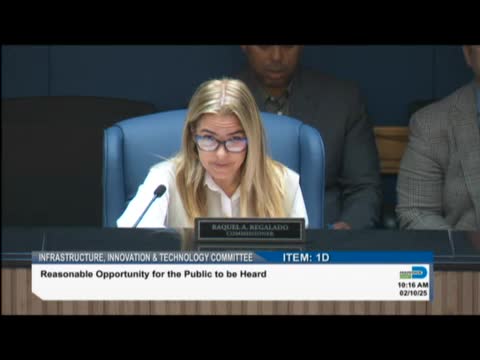Miramar officials and residents urge Miami‑Dade committee to reject Airport West incinerator
Get AI-powered insights, summaries, and transcripts
Subscribe
Summary
Dozens of Miramar officials, residents and environmental advocates told the Miami‑Dade Infrastructure, Innovation and Technology Committee they oppose siting a waste‑to‑energy incinerator at Airport West, citing PFAS, dioxins and other public‑health and environmental risks.
Dozens of residents and municipal officials — led by officials from the city of Miramar and environmental groups — urged the Miami‑Dade Infrastructure, Innovation and Technology Committee on Thursday not to site a waste‑to‑energy incinerator at the Airport West location, citing public‑health risks, potential PFAS emissions and threats to nearby ecosystems including the Everglades.
The comments came during the committee’s public‑comment period and before a package of recycling and landfill‑management measures was approved. Speakers asked the county to prioritize diversion, recycling and “0‑waste” alternatives rather than building a new incinerator.
Why it matters: Many speakers framed the issue as both a public‑health concern and a regional planning issue — noting that air and water contamination do not stop at municipal boundaries and that siting decisions could have cross‑county impacts.
What public speakers said
- Kelvin Baker, deputy city manager, City of Miramar: “There is a constituent that is released in the air called PFAS. And once it's in the air, it's available for individuals to consume. We just don't want to be a community that begin to, consume and, breathe in PFAS because we know that the public health issues that's tied to it.” (Testimony recorded for the public record.)
- Joy Smith, vice mayor of Westpark, noted close proximity of Westpark and Miramar and urged commissioners: “If it's not good for you, it's not good for us as well. ... Please vote no on it.”
- Michael Goldstein, representing the city of Miramar, submitted technical reports and told the committee that a county emissions analysis shows a proposed 4,000‑ton‑per‑day incinerator would be among the county’s largest industrial emitters for pollutants including dioxins and mercury. Goldstein said Miramar opposes an incinerator “anywhere in Miami‑Dade County.”
- Environmental groups and local organizers, including the Sierra Club and Catalyst Miami, urged the county to pursue lifecycle assessments and to broaden its alternatives beyond incineration; Sierra Club representatives said they had coordinated letters from more than 40 environmental and civic groups asking the county to expand its study and consider landfill and advanced reclamation alternatives.
- Miramar Mayor Wayne Messam: “We believe incineration technology does not belong in anyone's backyard especially next to the Everglades and next door to Miramar residents. Harmful dioxins and PFAS are not completely removed from even the latest technology of the newest incinerators that have been built worldwide.” Mayor Messam said the city supported the mayor’s office recommendation to reconsider building an incinerator at Airport West and called for a regional, tri‑county approach to resource recovery.
Speakers’ concerns and requests
Speakers named several recurring concerns: potential release of PFAS, dioxins, mercury and other toxins; risks to air and water quality; disproportionate siting of similar facilities in Black, Brown and Hispanic neighborhoods; and the long‑term reliance on an infrastructure that would require the steady “feeding” of waste. Several asked the county to complete the consultant’s lifecycle analysis and to explore alternatives used elsewhere — including advanced reclamation and regional landfill collaborations — before committing to a single technology.
What county staff and commissioners said
Committee members noted they had received consultant work and various technical reports and that several items under consideration at the meeting were intended to increase diversion and recycling capacity. Chairwoman Regalado said she wanted to move other items first to accommodate the number of speakers and municipal delegations in the room.
Next steps
The committee approved several diversion and recycling measures and forwarded a separate item about siting a waste‑to‑energy facility to the full Board of County Commissioners without a committee recommendation. Members and administration staff said full consideration, including the consultant’s lifecycle analysis and additional technical reports submitted by municipalities, would inform the full board’s deliberations.
Ending
Speakers and municipal officials requested continued engagement with the county and urged commissioners to prioritize alternative strategies that emphasize waste reduction, recycling, composting and regional cooperation rather than constructing a new incinerator.
